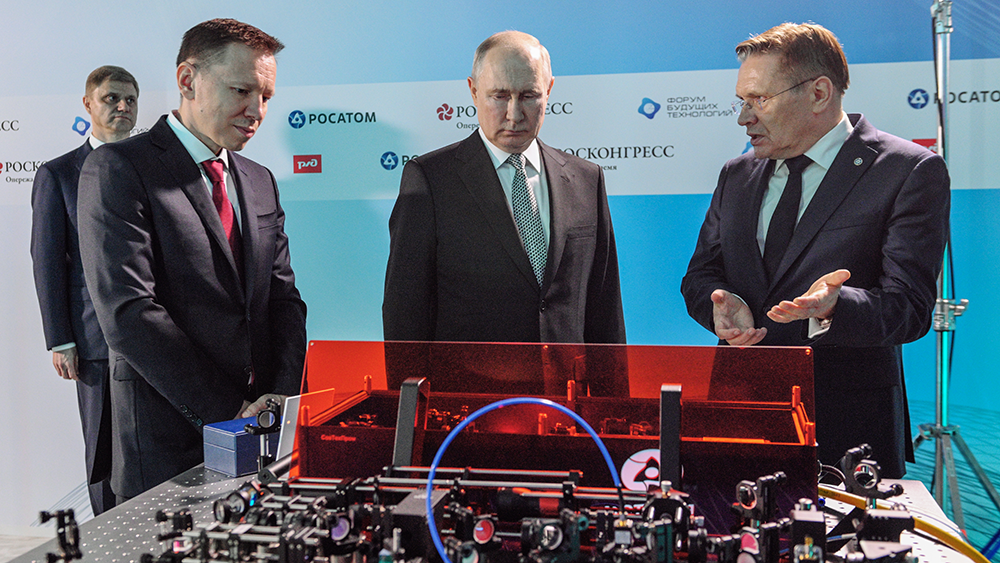
Today at the Forum for Future Technologies in Russia, President Vladimir Putin was shown through the country's current state in quantum computing — and it might be more developed than many would initially believe. Rosatom, the Russian State Nuclear Energy Corporation that's the main governmental body responsible for coordinating national efforts relating to technological innovation, showcased what it says is a 16-qubit trapped-ion-based quantum computer. And according to Rosatom's own press release on the matter, they've already run useful, molecule-simulating computations on it. The Russian processor is said to use the same quantum annealing technology that's been shown to be impressively useful for military applications.
There's quite a bit to digest here, assuming we don't have another "quantum, but not really" situation on our hands - one that mirrors Iran's recent attempt to shine a light on its quantum computing capabilities that, amusingly, backfired. (Perhaps someone in Iran should have read our "What is Quantum Computing" article.)
Developed by Russia's Lebedev Physical Institute of the Russian Academy of Sciences (LPI) and the Russian Quantum Center, the quantum computer seems to make use of trapped ion qubits with integrated photonics - an approach leveraged by marquee quantum computing companies such as Quantinuum (the child fathered by the merger of Honeywell and Cambridge Quantum) and IonQ to achieve higher qubit count scalability while also reducing the impact of noise. In quantum computing, noise refers to changes in the qubits' environment (such as vibrations, electromagnetic interference, temperature, and others) that destroy qubits' processing capabilities by collapsing the qubits' entanglement and state (and as such, the information they were processing as well).
Rosatom's push for Russia's quantum advances started at least from November 7th, 2019, when it launched Russia's program for the development of quantum computing and algorithmic solutions. Just one year later, Russia announced an investment of around $790 million in the country's quantum computing capabilities, covering quantum research funding for the next five years. More recently, as early as February 2022, ROSATOM announced the creation of the National Quantum Laboratory (NQL), which aims to consolidate national quantum knowledge within one roof, with teams hailing from a number of state and private entities across Russia (and some contributions from foreign specialists as well).
All this work, and today's quantum computer demonstration, however, started long before 2019. Ilya Semerikov, a researcher at the LPI Laboratory of Optics of Complex Quantum Systems, explained that work on trapped ions started as early as 2015. The team's efforts were vindicated when they built a quantum clock for GLONASS (the Russian geo-sat system that's equivalent to our Global Positioning System (GPS). That win led Rosatom to include trapped ion technology in its quantum computing roadmap as one possible technology to exploit.
"There was a big discussion about whether to include our ion platform in it [Rosatom's quantum plan]. And I am grateful to Rosatom, who believed in us then," Ilya Semerikov emphasized. According to Rosatom, the scientists have been living within the laboratory for over three years until today's delivery. "Our quantum computer, which is important, is already doing useful things - modeling molecules, and not doing scientific abstraction," said Ilya Semerikov.
Rosatom quotes a joking Vladimir Putin as saying that "the main thing is that the participants do not retire" (machine translation). So perhaps the scientists being cooped in their labs for the better part of three years isn't that out of the blue.
Those sacrifices have seemingly paid off, at least according to Rosatom's press release. But it seems that Russia's showcased quantum computer isn't one built out of the same clout as IBM's Quantum Processing Units (QPUs), which have achieved a 127-qubit count already, despite being in the quantum gate and superconducting qubits' class. Instead, it seems that Rosatom's demonstrated quantum computer is of the quantum annealing type. These quantum computers don't offer the same flexibility or general performance as their gate-based counterparts, so they won't crack the "quantum advantage" equation any time soon.
But... quantum annealing systems such as these are already delivering results outside the lab, as they're much easier to scale while being extremely focused on what they attempt to do: solving optimization problems such as BMW's 3,854-variable problem, solved by QCI (Quantum Computing Inc.) in a quantum annealing system.
Quantum annealing exploits a well-known physics principle: systems prefer to remain at their lowest-possible energy configuration. Luckily, this maps perfectly onto optimization problems that seek to find the optimal solution out of a range of possible ones, as the best solution is essentially the one with the lowest energy expenditure. Here, D-Wave shows their quantum annealing technology finding the best military solution to defend Honolulu. The program ran 67 million possibilities and excluded sixty-six thousand, nine hundred and ninety-nine others - in a mere 13 seconds.
Optimization solutions are the low-hanging fruit of quantum, but they're also highly valuable ones: there's no business, state, or military that would say no to the possibility of optimizing resource allocation, product design, logistics, and... Well, anything that offers itself to a number of possible solutions. And due to the number of variables, it'd take a linear, standard supercomputer an impractically long amount of time to sift through all of them.
It's perhaps not a coincidence that Russia's showcased quantum computer (despite only possessing 16 qubits) is of the quantum-annealing type. It's not only the lowest-hanging fruit (even if the quantum tree is an overly tall one); it's also the one that can bring the fastest turnaround on optimizing solutions that are especially impactful on the battlefield. Considering the length, horror, and expense of the Russia-Ukraine war (which has no end in sight), Russia prioritizing optimizations doesn't sound so out there. Does it?


.png?w=600)




